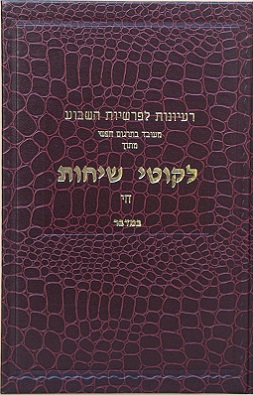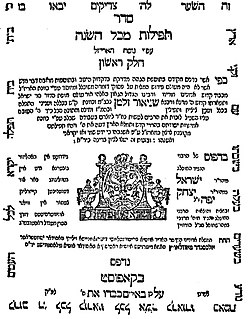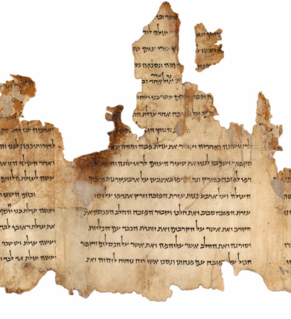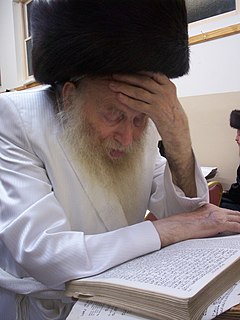
Menachem Mendel Schneersohn also known as the Tzemach Tzedek was an Orthodox rabbi, leading 19th-century posek, and the third Rebbe of the Chabad Lubavitch chasidic movement.

Shneur Zalman of Liady, was an Orthodox rabbi and the founder and first Rebbe of Chabad, a branch of Hasidic Judaism, then based in Liadi in the Russian Empire. He was the author of many works, and is best known for Shulchan Aruch HaRav, Tanya, and his Siddur Torah Or compiled according to the Nusach Ari. Zalman is a Yiddish variant of Solomon and Shneur is a Yiddish composite of the two Hebrew words "shnei ohr".

Sholom Dovber Schneersohn was the fifth Rebbe of the Chabad Lubavitch chasidic movement. He is known as "the Rebbe Rashab".
Dovber Schneuri was the second Rebbe of the Chabad Lubavitch Chasidic movement. Rabbi Dovber was the first Chabad rebbe to live in the town of Lyubavichi, the town for which this Hasidic dynasty is named. He is also known as the Mitteler Rebbe, being the second of the first three generations of Chabad leaders.

Rabbi Menachem Shmuel David Raichik was an Orthodox rabbi of the Chabad-Lubavitch Hasidic movement, and the pioneer of Chabad's activities in Los Angeles, California. Rabbi Raichik served as a Shaliach (Chabad) for the sixth and seventh Lubavitcher Rebbes.

Strashelye, is an extinct branch of the Chabad school of Hasidic Judaism, named after the town Strashelye in the Mohilev Province of present-day Belarus, where its leader lived. Like all Hasidism it is based on the teachings and customs of Chasidut as taught by the Baal Shem Tov, in turn based on the Kabbalistic works of Rabbi Isaac Luria.
Mashpia lit. "person of influence", pl. Mashpi'im is the title of a Hasidic rabbi who serves as a spiritual mentor, whose main influence and teachings are in matters of the worship of God, the correction of virtues and spiritual elevation.

Chabad messianism, or Lubavitch messianism, generally refers to the passion among adherents of the Chabad movement regarding the coming of the Messiah and their goal to raise awareness that his arrival is imminent. In addition, the term also refers more specifically to the belief that Rabbi Menachem Mendel Schneerson is the Messiah.
Reb Yoel Kahan is a senior Chabad rabbi, who served as the leading Choizer and Meiniach for the late Lubavitcher Rebbe, Rabbi Menachem Mendel Schneerson. He served in this role from the beginning of the Rebbe's leadership in 1950 until his death in 1994. Today he continues to serve as the senior Mashpia in the central Lubavitcher yeshiva at 770 Eastern Parkway. His position as leading Choizer and Meiniach makes him the default authority on the Rebbe's teachings specifically, and he is universally recognized as the greatest scholar of general Chabad Chassidic doctrine and thought. He is referred to familiarly amongst Chabad Chasidim as Reb Yoel. He is the son of Refoel Nachman (Folle) Kahn, author of Shemu'os VeSippurim. He has no children.

Likkutei Sichos, literally, "Collected Talks" contains both the scope and the core of the teachings of the Lubavitcher Rebbe, Rabbi Menachem Mendel Schneerson, and is the most authoritative source text for the Rebbe's unique, original, and often revolutionary explanation of Judaism.

Shneur Zalman Fradkin of Lublin (1830–1902), also known as the Toras Chessed or The Liader, was a famous Chabad posek and gaon. He was a disciple of the third Chabad-Lubavitch Rebbe, Rabbi Menachem Mendel Schneersohn.

Simon Jacobson is the author of Toward a Meaningful Life, founder of The Meaningful Life Center and publisher of the Yiddish English weekly, The Algemeiner Journal. Jacobson is a member of the Chabad-Lubavitch movement.

Maamarim/Ma'amorim in Chabad Hasidism are the central format texts of in-depth mystical investigation in Hasidic thought. In Chabad philosophy, the textual format of the Maamar is used in a great number of published works.

Chabad offshoot groups are those spawned from the Chabad-Lubavitch Hasidic Jewish movement. Many of these groups were founded to succeed previous Chabad leaders, acting as rivals to some of the dynastic rebbes of Chabad. Others were founded by former students of the movement, who, in forming their own groups, drew upon their experiences at Chabad.

Chabad customs and holidays are the practices, rituals and holidays performed and celebrated by adherents of the Chabad-Lubavitch Hasidic movement. The customs, or minhagim and prayer services are based on Lurianic kabbalah. The holidays are celebrations of events in Chabad history. General Chabad customs, called minhagim, distinguish the movement from other Hasidic groups.

Sefer Hamamaarim 5672, or Ayin Beis, is a compilation of the Chasidic treatises by Rabbi Sholom Dovber Schneersohn, the fifth Rebbe of Chabad, from the Hebrew year 5672 (1911-12). This series of Chassidic essays are considered a fundamental work of Chabad mysticism for its original treatment of many Chassidic concepts. The Ayin Beis series is one of the single longest works of Chabad philosophy. The work is also referred to as Hemshech Ayin Beis.

Siddur Im Dach is a Hasidic prayer book written by Rabbi Schneur Zalman of Liadi, the first Rebbe of the Chabad-Lubavitch movement. Accompanying the prayers are Hasidic discourses written by Rabbi Schneur Zalman.
Yud Shvat is a significant date on the Chabad Hasidic calendar. It is the yahrtzeit or anniversary of passing of the sixth Chabad Rebbe, Rabbi Yosef Yitzchak Schneersohn (1880–1950). The day also marks the formal acceptance of leadership in 1951 by the seventh Rebbe, Rabbi Menachem Mendel Schneerson (1902–1994). On Yud Shvat, Rabbi Menachem Mendel formally accepted the leadership of Chabad-Lubavitch movement with a public address and Hasidic discourse (maamar) at a gathering marking the first anniversary of his predecessor’s passing.












